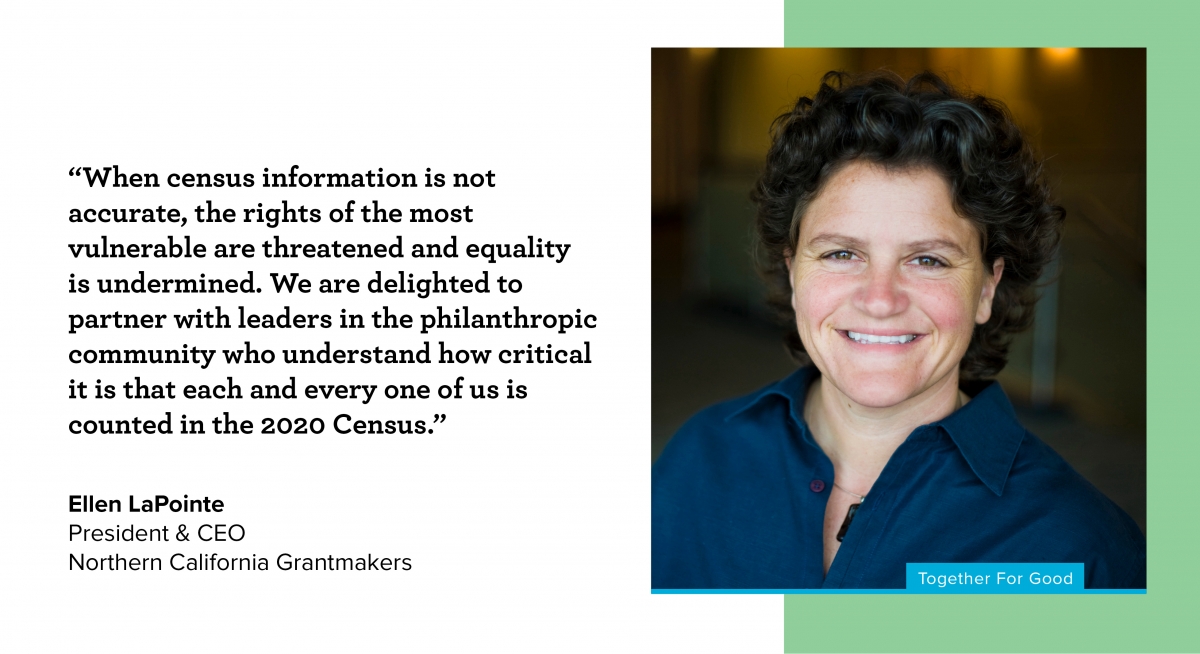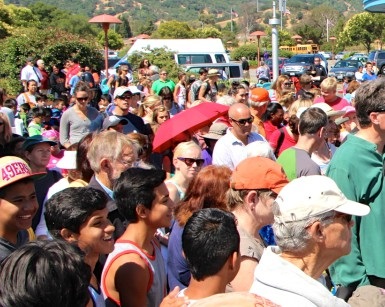Request for Proposals open until May 31, 2019
MOUNTAIN VIEW, Calif. – To ensure that all Bay Area residents are counted accurately and completely in the 2020 census, approximately $1 million in grants will be awarded to local nonprofits for census education and outreach efforts, a collaborative group of funding organizations announced this week.
The Bay Area Census Funders Collaborative – a partnership of Silicon Valley Community Foundation, the East Bay Community Foundation, Northern California Grantmakers, and numerous other funders – has been created to help ensure a fair and complete 2020 census count.
“Here’s why we need an accurate count: So that Californians get the right level of federal funding for public programs and the right amount of representation in Congress,” said Nicole Taylor, president and CEO of Silicon Valley Community Foundation. “We’re giving grants to Bay Area nonprofits to make sure everyone – including hard-to-count populations like children, the elderly, immigrants and homeless people – is counted in census 2020.”
There are some unprecedented challenges facing the 2020 census, however, including significant underfunding of the Census Bureau, the proposed addition of question about respondents’ citizenship, and the new online census questionnaire.
“When census information is not accurate, the rights of the most vulnerable are threatened and equality is undermined. We are delighted to partner with leaders in the philanthropic community who understand how critical it is that each and every one of us is counted in the 2020 Census,” said President and CEO Ellen LaPointe of Northern California Grantmakers.
To help meet the census’ challenges, the funders collaborative published its first Request for Proposals on Monday, April 15. At least $1 million in grant funding will be awarded to nonprofit groups for outreach and education efforts focused on the 2020 census. Grant applications must be submitted by Friday, May 31, 2019, at 11:59 p.m. Pacific time.
“The importance of the census count is often under-estimated,” said President and CEO James Head of the East Bay Community Foundation. “The East Bay, in particular, is home to a significant number of hard-to-count communities. Through this collaboration, we expect to support a range of innovative strategies to encourage full participation and ensure an accurate count, because this impacts not just the state’s influence but the power of local communities.”
The grants will be awarded to nonprofit organizations working to engage and promote the participation of hard-to-count communities in the nine-county Bay Area (Alameda, Contra Costa, Marin, Napa, San Francisco, San Mateo, Santa Clara, Solano and Sonoma counties).
The collaborative will host six information sessions throughout the region to review the RFP, eligibility, application process, selection criteria, and grant timeline.
To learn more about the funding collaborative and information session dates, times and locations, visit ncg.org/2020-census.
Media contacts:
Sue McAllister, VP, marketing and communications, Silicon Valley Community Foundation
650.450.5513 or sjmcallister@siliconvalleycf.org
Kayla Ballard, communications manager, Northern California Grantmakers
415.872.1019 or kballard@ncg.org
Stacey Manley, VP, communications, East Bay Community Foundation
510.208.0827 or smanley@eastbaycf.org
About Silicon Valley Community Foundation
Silicon Valley Community Foundation advances innovative philanthropic solutions to challenging problems. We engage donors and corporations from Silicon Valley, across the country and around the globe to make our region and world better for all. Our passion for helping people and organizations achieve their philanthropic dreams has created a global philanthropic enterprise committed to the belief that possibilities start here. Learn more at siliconvalleycf.org.
About East Bay Community Foundation
The East Bay Community Foundation is committed to advancing a Just East Bay. We partner with donors, social movements, and the community to eliminate structural barriers, advance racial equity, and transform political, social, and economic outcomes for all who call the East Bay home. Learn more at ebcf.org.
About Northern California Grantmakers
Northern California Grantmakers is an association of great people doing great work. We bring together foundations, nonprofit organizations, government, and business to tackle our region’s most pressing social issues. We pool resources, share information, and learn from each other, making our collective impact far greater than if we were going it alone. Learn more at ncg.org.
Retrieved from https://ncg.org/news/ensure-accurate-local-census-count-1-million-grant-funding-available-nonprofits.


